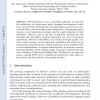Free Online Productivity Tools
i2Speak
i2Symbol
i2OCR
iTex2Img
iWeb2Print
iWeb2Shot
i2Type
iPdf2Split
iPdf2Merge
i2Bopomofo
i2Arabic
i2Style
i2Image
i2PDF
iLatex2Rtf
Sci2ools
QOSA
2010
Springer
2010
Springer
Using QoS-Contracts to Drive Architecture-Centric Self-adaptation
Self-adaptation is now a promising approach to maximize the satisfaction of requirements under changing environmental conditions. One of the key challenges for such self-adaptive systems is to automatically find a relevant architectural configuration. Existing approaches requires a set of adaptation strategies and the rough estimation of their side-effects. However, due to the lack of validation methods for such strategies and side-effects, existing approaches may lead to erroneous adaptations. Instead of side-effects, our solution leverages quality contracts whose accuracy can be separately established and which can be dynamically composed to get a quality prediction of any possible architectural configurations. To support self-adaptation, we propose a reactive planning algorithm which exploits quality contracts to dynamically discover unforeseen architectural configurations. We illustrate our approach using a running HTTP server adapting its architecture with respect to the number an...
Architectural Configurations | QOSA 2010 | Quality Contracts | Side-effects | Software Engineering |
| Added | 14 Feb 2011 |
| Updated | 14 Feb 2011 |
| Type | Journal |
| Year | 2010 |
| Where | QOSA |
| Authors | Franck Chauvel, Hui Song, Xiangping Chen, Gang Huang, Hong Mei |
Comments (0)

